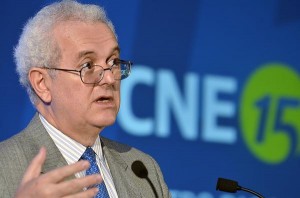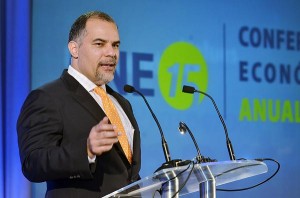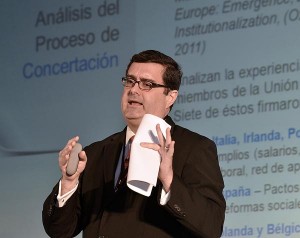CNE: Puerto Rico on track to become ‘Detroit of the Caribbean’

Puerto Rico needs to find alternative ways to govern itself that include all members of society with the single-minded goal of seeking solutions to its overwhelming fiscal and social problems, or risk going down the same path as Detroit, once a thriving city that is now desolate and in a state of emergency.
The alternative proposed by the Center for a New Economy, a nonprofit think-tank, is social partnerships to bring together the government, the private sector, grassroots organizations, academia and other members of society to find ways to deal with Puerto Rico’s serious structural issues via consensus.
However, considering this island’s marked political and social divisions, establishing such partnerships successfully is likely easier said than done.
“Puerto Rico lacks maturity as a people and sectors to achieve genuine social partnership. The Retirement Systems issue is an example — we’re already seeing everybody pull toward their own sides,” said Mike Soto-Class, president of the CNE, as part of his opening remarks during the group’s annual convention Friday.
“We talk about social partnership like it’s a sort of magic potion that everyone prescribes for any problem and difficulty; however, setting down a the path of a true consultation process that would lead to shared solutions to our multiple systemic and structural collapses is a difficult challenge but at the same time urgent,” he said.
Historically speaking, neither Puerto Rico nor the United States have been familiar with social partnerships, which have been used as governance models in countries throughout Europe and Latin America implementing sweeping reforms.
But at this moment in history, Puerto Rico is ticking off most of the boxes needed to justify social partnerships as a way to begin addressing problems: a chronic deficit (since 2000) an unemployment rate above 10 percent (now at 14 percent) and an institutional debt of more than 60 percent (Puerto Rico’s is at 100 percent).
“All governments facing difficult economic problems are eventually forced to implement significant reforms. But governments with strong electoral majorities tend to favor the implementation of unilateral solutions as they don’t believe they need allies to succeed, while electorally weak or unstable governments, by definition, can not impose unilateral solutions and are forced to seek other social support outside their natural political basis,” said Sergio Marxuach, the CNE’s public policy director.
No money for basic needs
Puerto Rico has a GNP of $66.4 billion, with which it must finance basic services such as health, education, security and infrastructure, pay bondholders, public sector retirees and address the insolvency at five major public corporations. However, bondholders alone are owed $70 billion, while public employee retirement system are dragging a $35.2 billion shortfall.
“We have to figure out a way to divide that GNP to meet our obligations with each of those segments. I believe Puerto Rico cannot meet all of its obligations or everything that it has promised citizens, bondholders and retirees with the resources we have,” he said. “We have to significantly restructure our economy, our obligations or both to be able to meet our obligations and manage our economy in a sustainable way.”
Since applying the social partnership concept has never been done in Puerto Rico, Marxuach suggested starting small rather than attempting to implement a large-scale initiative. He suggested the broke public employees Pension Systems as a starting point.
“The systems are in crisis. The problem has extremely complex financial, political, legal, and moral dimensions. No party or political faction has the power to impose a unilateral solution to a problem that affects a large portion of the population and whose solution requires sacrifices from all parties concerned,” he said.
Without an effective reform, Puerto Rico’s public employees retirement system will bottom out in Fiscal 2014. Last week, government officials unveiled their plan to address some of the problems, calling for benefit cuts for current and future participants.
Armed with that plan, Government Development Bank President Javier Ferrer and Treasury Secretary Melba Acosta went to New York last Friday to meet with credit ratings agencies to convince them not to downgrade the island’s credit status to junk — a decision that hinges mostly on fixing the Retirement Systems issue.
“The plan to fix the Retirement Systems must be financially viable and politically credible. That’s vital because this is a long-term plan,” Marxuach said. “The government is making a mistake by presenting a plan to credit ratings agencies without having presented it first to lawmakers, labor leaders and other interested parties. It’s not going to work.”
‘Detroit of the Caribbean’
The problems Puerto Rico is facing are affecting everyone on a certain level, making all citizens responsible for rowing in the same direction toward a solution. That is especially true considering that if the credit agencies — Moody’s, Standard & Poor’s and Fitch — decide to downgrade Puerto Rico’s ratings, the implications would be widespread.
“It would unleash a financial crisis, with an increase in interest rates and a massive contraction in credit. Bankruptcies would increase and the unemployment level could exceed 20 percent, which could lead to social unrest and protests,” Marxuach said. “We would be seeing increased migration, mostly by young professionals heading to other places in search for a better life.”
And nobody is coming to Puerto Rico’s rescue, he said.
“We have to think about alternative ways to govern ourselves, to do things. We’re headed to become the Detroit of the Caribbean, a desolate post-industrial wasteland, where teachers have no chalk, police have no bullets for training, and the Family Department leaves thousands of defenseless children to the fate of God,” Marxuach said during his compelling presentation. “No one cared much about Detroit until the Dow collapsed in 2008.”

José Ocampo, professor of professional practice in the School of International and Public Affairs and member of the Committee on Global Thought, Columbia University (Credit: © Mauricio Pascual)
Just a few hours before the CNE held its annual convention Friday, Michigan Gov. Rick Snyder announced his decision to force the Detroit city government to cede its authority to state officials appointed to address its fiscal emergency.
Restructuring based on consultation
The crisis Puerto Rico is facing should be enough of a trigger to seek out a social partnership structure, where the government takes the lead, but the private sector plays a pivotal role, said José Ocampo, professor of professional practice in the School of International and Public Affairs and member of the Committee on Global Thought, Columbia University, during his convention keynote speech.
“Puerto Rico should consider drafting an agreement to restructure the economy based on consultation. Politicians, the corporate sector — which should be the core of the group — labor groups and academia must contribute,” he said. “Government must show great flexibility in its public policy and open the possibility to alternatives it has not thought about and that may even go against its beliefs.”
“Puerto Rico has one of the highest unemployment rates in the world, as well as the highest levels of poverty and social inequality. The critical situation offers a chance to change, and social consensus provides the tools to do that,” he said.
















One reason this happens is that Puerto Rico, like the U.S., thinks that by concentrating
all growth of development in the San Juan area, “the top,” wealth will somehow “trickle down” throughout the island. As long as all the money and attention stays in one area, at the expense of the rest of the island, Puerto Rico will always not be taken seriously. There needs to be a more diverse approach in developing and showcasing the island, as a whole, according to regional areas’ strengths. If you were to ask anyone in the US to list a major PR city, other than San Juan, and what it’s known for, you’ll get a blank stare. Why? Because all anyone ever hears about is the San Juan area and it’s high crime rate. The government needs to focus on changing that mindset. There are many beautiful areas in Puerto Rico that never make it to the headlines, and that, is a shame.